高中英语 人教版必修4 Unit2 Working the land 动词-ing形式作主语和宾语课件(34张)
文档属性
| 名称 | 高中英语 人教版必修4 Unit2 Working the land 动词-ing形式作主语和宾语课件(34张) |
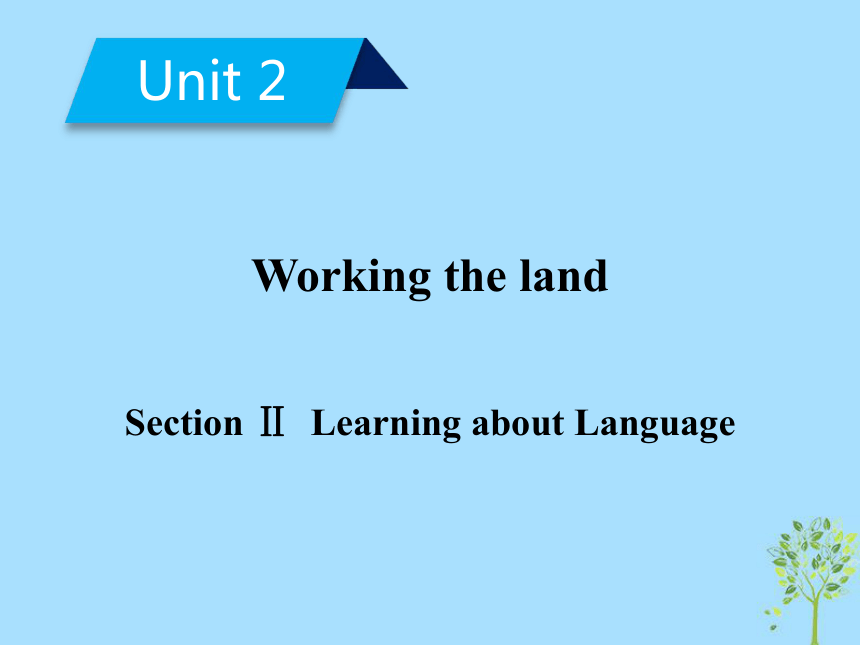
|
|
| 格式 | zip | ||
| 文件大小 | 219.3KB | ||
| 资源类型 | 教案 | ||
| 版本资源 | 人教版(新课程标准) | ||
| 科目 | 英语 | ||
| 更新时间 | 2019-02-21 00:00:00 | ||
图片预览

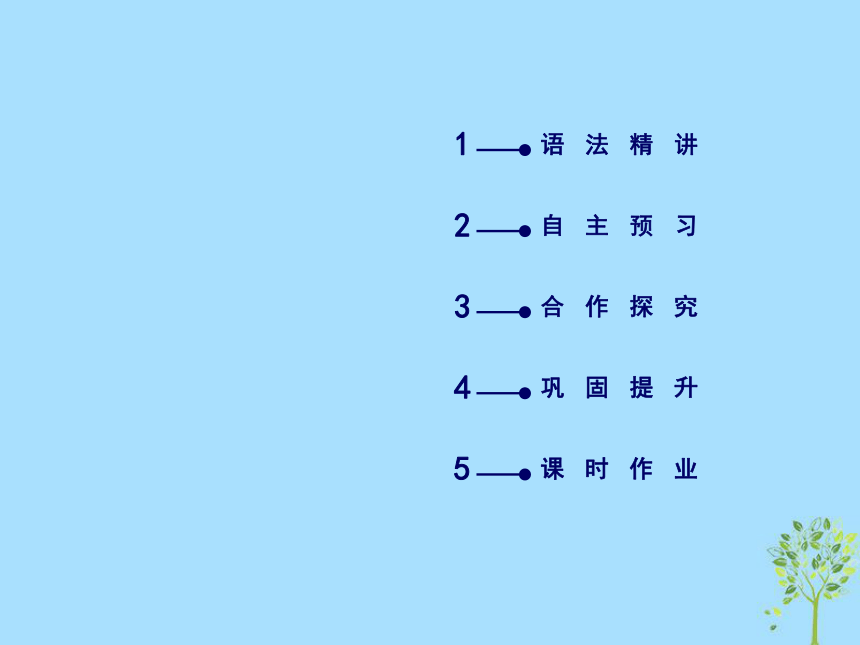



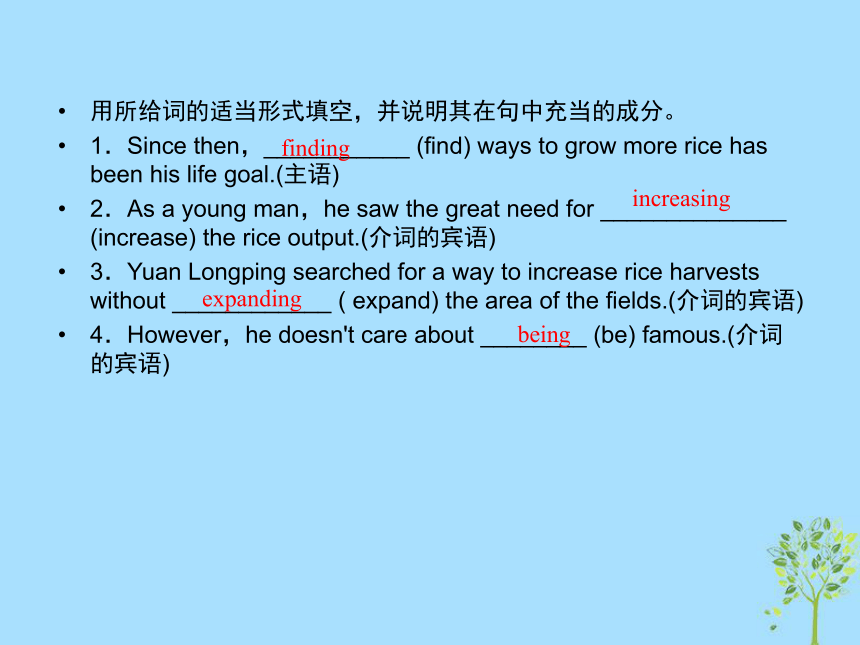
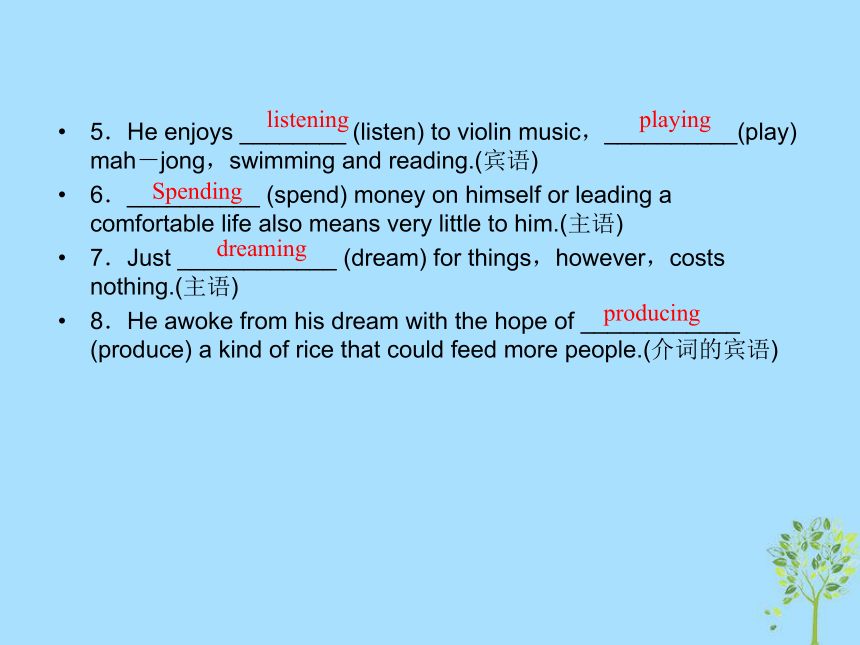

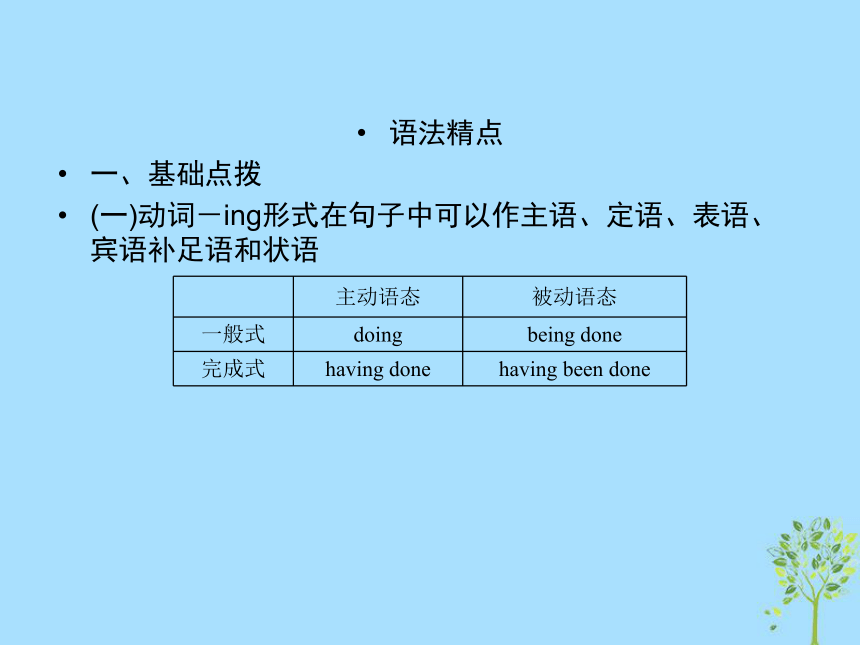
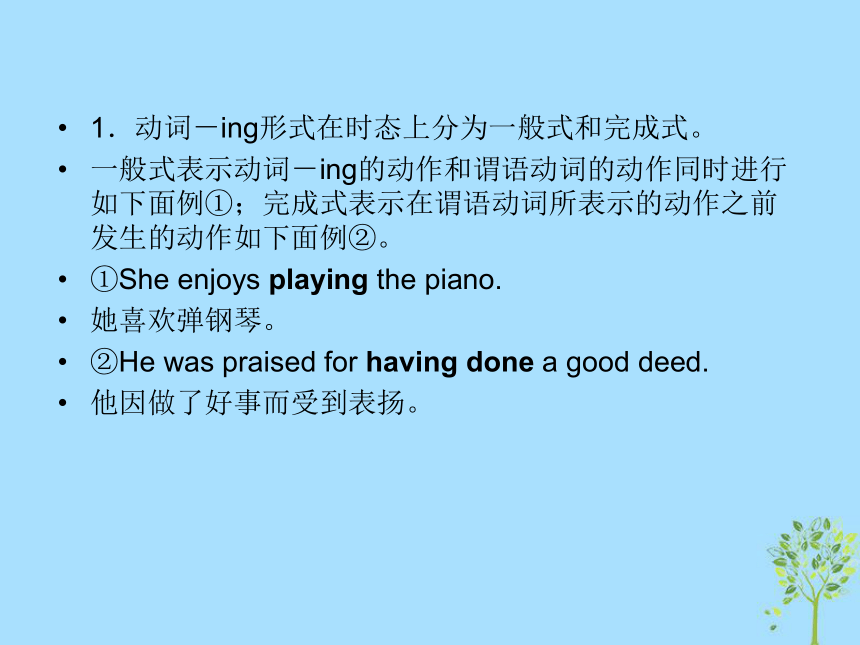
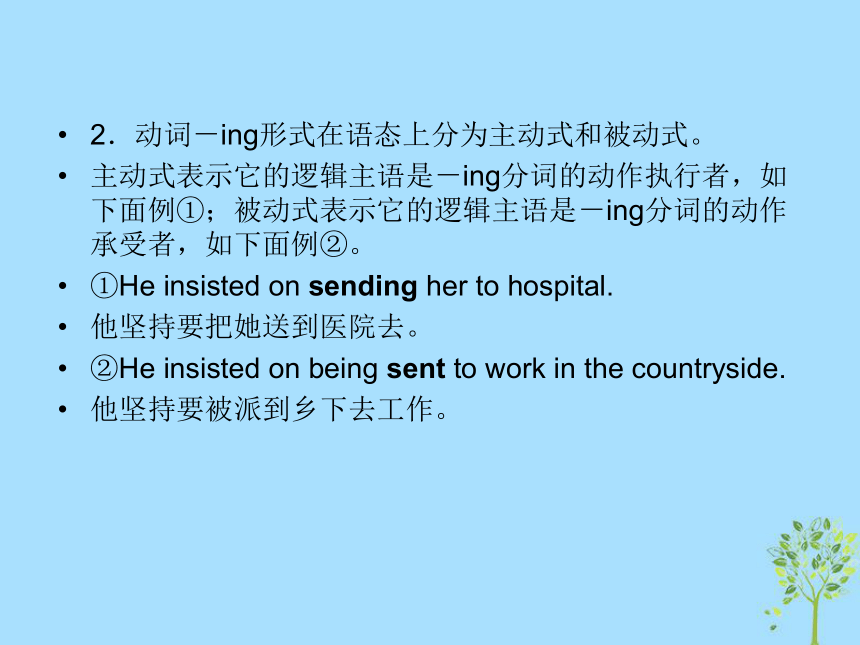
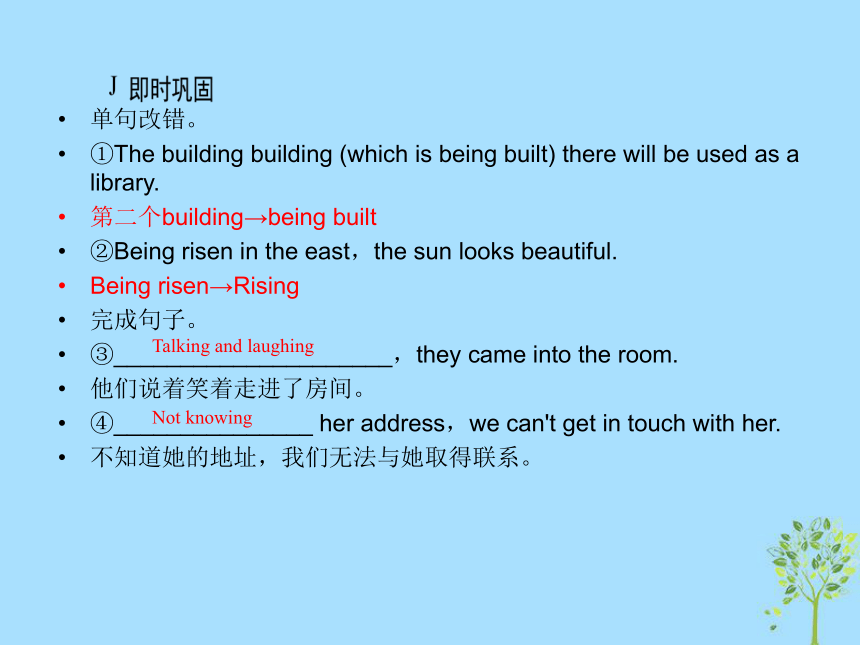
文档简介
课件34张PPT。Unit 2 Working the land Section Ⅱ Learning about Language语 法 精 讲情态动词(Ⅰ)
动词-ing形式作主语和宾语自 主 预 习用所给词的适当形式填空,并说明其在句中充当的成分。
1.Since then,___________ (find) ways to grow more rice has been his life goal.(主语)
2.As a young man,he saw the great need for ______________ (increase) the rice output.(介词的宾语)
3.Yuan Longping searched for a way to increase rice harvests without ____________ ( expand) the area of the fields.(介词的宾语)
4.However,he doesn't care about ________ (be) famous.(介词的宾语)finding increasing expanding being 5.He enjoys ________ (listen) to violin music,__________(play) mah-jong,swimming and reading.(宾语)
6.__________ (spend) money on himself or leading a comfortable life also means very little to him.(主语)
7.Just ____________ (dream) for things,however,costs nothing.(主语)
8.He awoke from his dream with the hope of ____________ (produce) a kind of rice that could feed more people.(介词的宾语)listening playing Spending dreaming producing 合 作 探 究语法精点
一、基础点拨
(一)动词-ing形式在句子中可以作主语、定语、表语、宾语补足语和状语1.动词-ing形式在时态上分为一般式和完成式。
一般式表示动词-ing的动作和谓语动词的动作同时进行如下面例①;完成式表示在谓语动词所表示的动作之前发生的动作如下面例②。
①She enjoys playing the piano.
她喜欢弹钢琴。
②He was praised for having done a good deed.
他因做了好事而受到表扬。2.动词-ing形式在语态上分为主动式和被动式。
主动式表示它的逻辑主语是-ing分词的动作执行者,如下面例①;被动式表示它的逻辑主语是-ing分词的动作承受者,如下面例②。
①He insisted on sending her to hospital.
他坚持要把她送到医院去。
②He insisted on being sent to work in the countryside.
他坚持要被派到乡下去工作。单句改错。
①The building building (which is being built) there will be used as a library.
第二个building→being built
②Being risen in the east,the sun looks beautiful.
Being risen→Rising
完成句子。
③_____________________,they came into the room.
他们说着笑着走进了房间。
④_______________ her address,we can't get in touch with her.
不知道她的地址,我们无法与她取得联系。Talking and laughing Not knowing (二)动词-ing的形式作主语
1.动词-ing形式作主语时,多表示经常性、习惯性的动作,谓语动词多用单数形式。
①Laughing often will benefit you a lot.
笑口常开好处多多。
②Having lived abroad for a long time makes him homesick.
在国外生活了很久令他想家。2.形式主语it代替动词-ing形式作主语的常见结构:
(1)It is+adj.+doing sth.
It is/feels funny doing sth.做某事(感觉)很滑稽。
It is useless doing sth.做某事无用
It's worthwhile doing sth.做某事是值得的
(2)It is a waste of+n.+doing sth.
It's a waste of time doing sth.做某事是浪费时间
(3)It is no+n.+doing sth.
It's no good/no use/no fun doing sth.
做某事没好处/没用/没意思(4)There be+no+doing(joking/knowing...)
①It is useless making such efforts.
做这样的努力是没用的。
②It is a waste of time doing such work.
做这样的工作是浪费时间。
③It is no good saying such words.
说那样的话没有好处。
④There is no knowing how the project will be carried out.
不知道这个工程将如何实施。①_____________________________ the mean man.
和这个吝啬的人争辩是没用的。
②____________ just _________________ doing nothing.
什么都不做,只是待在家里没意思。
③There is ______________ how the project will be carried out.
不知道这个工程将如何实施。
④________________ my favourite sport.
游泳是我最喜欢的一项运动。
⑤Seeing is believing.(英译汉)
________________。It is useless/no use arguing with It is no fun staying at home no knowing Swimming is 眼见为实 (三)动词-ing形式作宾语
1.在admit,avoid,consider(考虑),enjoy,escape,excuse,finish,imagine,mind,miss,practise,suggest,delay,appreciate等动词之后只能用动词-ing形式作宾语,不能用不定式。
①He finally admitted having made such a mistake.
他终于承认犯了那样的错误。
②The little girl practises playing the piano everyday.
这个小女孩每天练习弹钢琴。2.在动词短语give up,put off,get to(着手),object to,look forward to,devote oneself to,can't help(禁不住),can't bear/stand等之后用动词-ing形式作宾语。
①I'm looking forward to hearing from you.
我盼望着收到你的来信。
②He devotes himself to looking into the matter.
他致力于调查这件事。用所给词的适当形式填空。
①I'm looking forward to ________ (hear) from you.
②He devotes himself to ________ (look) into the matter.
③He finally admitted ________ (make) such a mistake.
④She likes spending much money ________ (buy)clothes for herself.hearing looking making buying 二、难点突破
(一)某些动词及动词短语后面既可以用不定式也可以用动词-ing作宾语
1.动词begin,start,continue等后既可跟不定式,又可跟动词-ing作宾语,意义基本相同。
①They continued reading/to read .
他们继续朗读。2.动词love,like,hate等后可跟动词-ing和不定式作宾语,但接动名词表示经常性的情况,接不定式表示具体的动作。
①I hate walking in such a rainy day.(习惯)
我不喜欢在这样的雨天里散步。
②I hate to trouble you.(动作)
我真不愿麻烦你。
3.一些动词后既可跟动词-ing作宾语,又可跟不定式作宾语,但意义有很大差别。
①I remembered locking the door.(记着事情做了)
我记着锁门了。
②When you leave the house,please remember to lock the door.(记着去做)
你离开家时,记着锁门。4.在need,want,require,demand后用动词-ing的主动形式表示被动(need/want/require/demand doing= need/want/require/demand to be done).
①The cottage needs repairing.=The cottage needs to be repaired.
这所农舍需要修理。
②The letter demands answering at once.
=The letter demands to be answered at once.
需要立刻回复这封信。(二)动词-ing形式作宾语时,省掉介词的常见结构
spend...(in) doing花费……做某事
have difficulty/trouble(in)doing...做……有困难/麻烦
stop/prevent...(from) doing阻止……做某事
waste time(in)doing浪费时间做某事
be busy(in) doing忙于做某事
have a good/hard time(in)doing做某事高兴/费了很大劲
*He is usually busy managing his shop.
他通常忙于经营商店。(三)动词-ing的复合结构
1.动词-ing的复合结构作主语。
①His being late again made his boss very angry.
他的又一次迟到令他的老板很生气。
②Mary's winning the game made her parents proud of her.
玛丽赢得这场比赛让她的父母以她为傲。2.动名词的复合结构作宾语。
①He made an apology for his/him telling lies to the public.
他因向公众撒谎而道歉。
②Outside the classroom,we could hear the noise of the desks being opened and closed.
在教室外,我们能够听到课桌被打开及关闭的声音。The chairman of the meeting was angry at John's/John being absent from the meeting.
会议主席因约翰的缺席而生气。①Jerry's not arriving on time made people present angry.
杰里未能按时到达令在场的人很生气。
②Not knowing what has happened to his daughter makes the father upset.
不知道女儿发生了什么使得这位父亲很是不安。英汉互译
①Don't forget to write to your mother.
不要忘了给你母亲写信。
②I shall never forget seeing the famous writer.
我永远不会忘记见到过那位著名作家。
③我真后悔错过了那次报告会。
I regret missing the report.
④我遗憾地告诉你我不能采纳你的建议。
I regret to tell you I can't take your advice.
动词-ing形式作主语和宾语自 主 预 习用所给词的适当形式填空,并说明其在句中充当的成分。
1.Since then,___________ (find) ways to grow more rice has been his life goal.(主语)
2.As a young man,he saw the great need for ______________ (increase) the rice output.(介词的宾语)
3.Yuan Longping searched for a way to increase rice harvests without ____________ ( expand) the area of the fields.(介词的宾语)
4.However,he doesn't care about ________ (be) famous.(介词的宾语)finding increasing expanding being 5.He enjoys ________ (listen) to violin music,__________(play) mah-jong,swimming and reading.(宾语)
6.__________ (spend) money on himself or leading a comfortable life also means very little to him.(主语)
7.Just ____________ (dream) for things,however,costs nothing.(主语)
8.He awoke from his dream with the hope of ____________ (produce) a kind of rice that could feed more people.(介词的宾语)listening playing Spending dreaming producing 合 作 探 究语法精点
一、基础点拨
(一)动词-ing形式在句子中可以作主语、定语、表语、宾语补足语和状语1.动词-ing形式在时态上分为一般式和完成式。
一般式表示动词-ing的动作和谓语动词的动作同时进行如下面例①;完成式表示在谓语动词所表示的动作之前发生的动作如下面例②。
①She enjoys playing the piano.
她喜欢弹钢琴。
②He was praised for having done a good deed.
他因做了好事而受到表扬。2.动词-ing形式在语态上分为主动式和被动式。
主动式表示它的逻辑主语是-ing分词的动作执行者,如下面例①;被动式表示它的逻辑主语是-ing分词的动作承受者,如下面例②。
①He insisted on sending her to hospital.
他坚持要把她送到医院去。
②He insisted on being sent to work in the countryside.
他坚持要被派到乡下去工作。单句改错。
①The building building (which is being built) there will be used as a library.
第二个building→being built
②Being risen in the east,the sun looks beautiful.
Being risen→Rising
完成句子。
③_____________________,they came into the room.
他们说着笑着走进了房间。
④_______________ her address,we can't get in touch with her.
不知道她的地址,我们无法与她取得联系。Talking and laughing Not knowing (二)动词-ing的形式作主语
1.动词-ing形式作主语时,多表示经常性、习惯性的动作,谓语动词多用单数形式。
①Laughing often will benefit you a lot.
笑口常开好处多多。
②Having lived abroad for a long time makes him homesick.
在国外生活了很久令他想家。2.形式主语it代替动词-ing形式作主语的常见结构:
(1)It is+adj.+doing sth.
It is/feels funny doing sth.做某事(感觉)很滑稽。
It is useless doing sth.做某事无用
It's worthwhile doing sth.做某事是值得的
(2)It is a waste of+n.+doing sth.
It's a waste of time doing sth.做某事是浪费时间
(3)It is no+n.+doing sth.
It's no good/no use/no fun doing sth.
做某事没好处/没用/没意思(4)There be+no+doing(joking/knowing...)
①It is useless making such efforts.
做这样的努力是没用的。
②It is a waste of time doing such work.
做这样的工作是浪费时间。
③It is no good saying such words.
说那样的话没有好处。
④There is no knowing how the project will be carried out.
不知道这个工程将如何实施。①_____________________________ the mean man.
和这个吝啬的人争辩是没用的。
②____________ just _________________ doing nothing.
什么都不做,只是待在家里没意思。
③There is ______________ how the project will be carried out.
不知道这个工程将如何实施。
④________________ my favourite sport.
游泳是我最喜欢的一项运动。
⑤Seeing is believing.(英译汉)
________________。It is useless/no use arguing with It is no fun staying at home no knowing Swimming is 眼见为实 (三)动词-ing形式作宾语
1.在admit,avoid,consider(考虑),enjoy,escape,excuse,finish,imagine,mind,miss,practise,suggest,delay,appreciate等动词之后只能用动词-ing形式作宾语,不能用不定式。
①He finally admitted having made such a mistake.
他终于承认犯了那样的错误。
②The little girl practises playing the piano everyday.
这个小女孩每天练习弹钢琴。2.在动词短语give up,put off,get to(着手),object to,look forward to,devote oneself to,can't help(禁不住),can't bear/stand等之后用动词-ing形式作宾语。
①I'm looking forward to hearing from you.
我盼望着收到你的来信。
②He devotes himself to looking into the matter.
他致力于调查这件事。用所给词的适当形式填空。
①I'm looking forward to ________ (hear) from you.
②He devotes himself to ________ (look) into the matter.
③He finally admitted ________ (make) such a mistake.
④She likes spending much money ________ (buy)clothes for herself.hearing looking making buying 二、难点突破
(一)某些动词及动词短语后面既可以用不定式也可以用动词-ing作宾语
1.动词begin,start,continue等后既可跟不定式,又可跟动词-ing作宾语,意义基本相同。
①They continued reading/to read .
他们继续朗读。2.动词love,like,hate等后可跟动词-ing和不定式作宾语,但接动名词表示经常性的情况,接不定式表示具体的动作。
①I hate walking in such a rainy day.(习惯)
我不喜欢在这样的雨天里散步。
②I hate to trouble you.(动作)
我真不愿麻烦你。
3.一些动词后既可跟动词-ing作宾语,又可跟不定式作宾语,但意义有很大差别。
①I remembered locking the door.(记着事情做了)
我记着锁门了。
②When you leave the house,please remember to lock the door.(记着去做)
你离开家时,记着锁门。4.在need,want,require,demand后用动词-ing的主动形式表示被动(need/want/require/demand doing= need/want/require/demand to be done).
①The cottage needs repairing.=The cottage needs to be repaired.
这所农舍需要修理。
②The letter demands answering at once.
=The letter demands to be answered at once.
需要立刻回复这封信。(二)动词-ing形式作宾语时,省掉介词的常见结构
spend...(in) doing花费……做某事
have difficulty/trouble(in)doing...做……有困难/麻烦
stop/prevent...(from) doing阻止……做某事
waste time(in)doing浪费时间做某事
be busy(in) doing忙于做某事
have a good/hard time(in)doing做某事高兴/费了很大劲
*He is usually busy managing his shop.
他通常忙于经营商店。(三)动词-ing的复合结构
1.动词-ing的复合结构作主语。
①His being late again made his boss very angry.
他的又一次迟到令他的老板很生气。
②Mary's winning the game made her parents proud of her.
玛丽赢得这场比赛让她的父母以她为傲。2.动名词的复合结构作宾语。
①He made an apology for his/him telling lies to the public.
他因向公众撒谎而道歉。
②Outside the classroom,we could hear the noise of the desks being opened and closed.
在教室外,我们能够听到课桌被打开及关闭的声音。The chairman of the meeting was angry at John's/John being absent from the meeting.
会议主席因约翰的缺席而生气。①Jerry's not arriving on time made people present angry.
杰里未能按时到达令在场的人很生气。
②Not knowing what has happened to his daughter makes the father upset.
不知道女儿发生了什么使得这位父亲很是不安。英汉互译
①Don't forget to write to your mother.
不要忘了给你母亲写信。
②I shall never forget seeing the famous writer.
我永远不会忘记见到过那位著名作家。
③我真后悔错过了那次报告会。
I regret missing the report.
④我遗憾地告诉你我不能采纳你的建议。
I regret to tell you I can't take your advice.
同课章节目录
